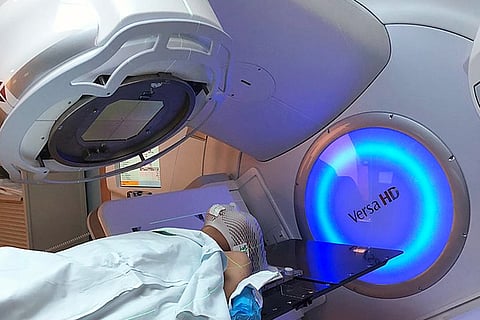

A clinical trial to treat COVID-19 patients with one-time low-dose radiation therapy, in an attempt to reduce dependency on oxygen and ventilator support, will soon be underway in Bengaluru. According to sources, the government-run Kidwai Memorial Institute of Oncology may be one of the centres for these trials. Similar trials have taken place in AIIMS Delhi and some are underway in other parts of the country including neighbouring state of Tamil Nadu. This treatment is only targeted for patients who are already on oxygen support and may be requiring ventilator support in the short term.
Like all clinical trials, it will require informed consent of patients and will document short-term and long-term side effects of this treatment and assess its efficacy. In the AIIMS pilot study conducted from June to August 2020, nine out of 10 patients recovered within 3-7 days. One patient, who has hypertension, showed clinical deterioration and died 24 days after receiving the low-dose radiotherapy. No patients showed the signs of acute radiation toxicity.
Dr Lohit Reddy, Consultant Radiation Oncologist at HCG Hospital, which is among the centres where the clinical trial will take place, said they will start the trials in a matter of weeks. “There have been studies in India and abroad where it has been seen that radiation therapy is beneficial. Usually, the radiation for a cancer patient will be for 25-30 days using 60-70 grey (units). But for COVID-19 patients, the idea is to give a low dose, less than a gray on a single setting,” he said. Gray is a unit for measuring radiation intensity. “Even during Spanish Flu in the early 1900s, they used radiotherapy/X-Ray to treat pneumonia. We will attempt to modulate the immune system,” he added.
Dr Lohit explained that this treatment trial will be only for patients who are needing oxygen support or mechanical ventilation. “When the patients are going through the cytokine storm (where the body begins to attack its own cells and tissues than just fighting against the virus) which causes damage to the lungs and results in acute respiratory distress syndrome, radiotherapy will be used before this cytokine storm to suppress the immune system,” he said.
He added, “So far, studies suggest we have to give radiation when the patient is getting more dependent on oxygen. With this, the degree of oxygen dependency will come down and probably the recovery time will go down as well.”
Dr CN Manjunath, member of the state-level Technical Advisory Committee, said, there is need for more data from trials to make the method of treatment as part of the standard protocol. “We need more data to decide on it,” he said.